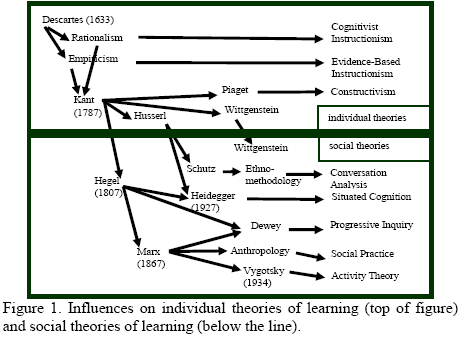Learning theory
This article or section is currently under construction
In principle, someone is working on it and there should be a better version in a not so distant future.
If you want to modify this page, please discuss it with the person working on it (see the "history")
Definition
Learning theories make general statements about how people learn (at least for a given class of learning types. Therefore learning theories are mostly descriptive.
As an example, situated learning claims that learning is strongly tied to the context and the activity in which it occurs. In order to learn a concept in a useful way it must be learned in the culture in which is has been developed and is used. Activity and perception are prior to conceptualization. The teaching and learning situation is characterized as cognitive apprenticeship. From that follows that the acitvity of learning must take place in an authentic situation.
Learning theories also can be prescriptive (tell how people should learn), but mostly prescription is the role of pedagogical theory.
Major schools of thought
In the literature related to education (in particular in educational technology, it is not always easy to separate learning theory from educational theory.
Most introductory texts distinguish between three large families of thought.
Behaviorism
Behaviorism is interested in looking at behavior and observational changes.
Cognitivism
Cognitivism is interessted in looking at the thought processes behind the behavior.
Constructivism
- Constructivism claims that knowledge is constructed
There are several variants, e.g.
Gerry Stahl (2003: 6) provideded a graphical representation of how the influences mentioned here led to social versus individual theories of learning:
Learning theories play a major role in most instructional design models and the field educational technology
Links
- Learning Theories
- Explorations in Learning & Instruction: The Theory Into Practice Database, probably the best hypertext available
- Marcel Crahay, Psychologie du développement et apprentissage en situation scolaire (71211) Support du cours
- Blaise Balmer, Histoire illustrée des théories de l'apprentissage
- Depover Christian, Bruno De Lièvre, Jean-Jacques Quintin, Filippo Porco et Cédric Floquet. Les modèles d'enseignement et d'apprentissage
- Peter J. Patsula, Sookmyung Women's University, Seoul. (1999). Applying Learning Theories to Online Instructional Design
References
- Stahl, G. (2003) Building Collaborative Knowing: Elements Of A Social Theory Of CSCL, In J.W. Strijbos, P.Kirschner & R. Martins (ed.), What we know about CSCL in higher education, Amsterdam: Kluwer.
